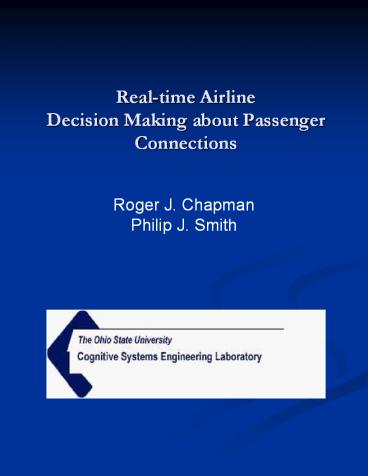Roger J' Chapman - PowerPoint PPT Presentation
1 / 14
Title:
Roger J' Chapman
Description:
When a large number of scheduled arrivals to an airline's hub are ... Ill-Will Model (Source: 'The Handbook of Airline Economics'.) Goal and Methods Used ... – PowerPoint PPT presentation
Number of Views:37
Avg rating:3.0/5.0
Title: Roger J' Chapman
1
Real-time Airline Decision Making about
Passenger Connections
Roger J. Chapman Philip J. Smith
2
Problem
- When a large number of scheduled arrivals to an
airlines hub are delayed due to local
conditions, such as bad weather, a complex
decision making situation is created with regard
to passenger connections, leading to sub-optimal
decisions - Complicating Factors
- Uncertainty about arrival times
- Many arrival-departure combinations
- Multiple factors contribute to the importance of
each arrival and departure - Gate constraints
- Other airline decision makers are affected by any
corrective response
3
The Passenger Ill-Will Model
(Source The Handbook of Airline Economics.)
4
Goal and Methods Used
- Goal
- After gaining a complete system perspective at a
major airlines hub, identify causal
relationships and redesign opportunities to
achieve closer to optimal performance - Research Methods
- Ethnographic Field Observations
- Process Tracing
- Structured Interviews
- Analytical Analysis
5
Observations
- The airlines decision makers studied did not
control arrivals, but could decide whether to
hold departures, with one composite decision per
arrival-departure complex - Computer support provided basic data about each
connection leaving some data gathering and much
aggregation to the decision maker - The airlines hold rule involved several
conditions, e.g. a minimum number of connecting
passengers and a maximum estimated departure hold
time
6
Guideline for Decision Making
- Within 30 minutes of the first departure in this
complex generate a hard copy of the data shown in
XXX1 including all flights arriving within 15
minutes of complex departure time. - For each arriving flight with four connecting
passengers on a departing flight, - if the departing flight is
- (not covered by a wing tip service2) and
- (not a flight that has been delayed often) and
- (not already oversold) and
- (not a high frequency service) and
- (the impact on the next use of the departing
aircraft would be acceptable) and (hotel
availability is not a problem if this is the
last flight to the destination or a flight in
the last two complexes) and (the departing
flight would not have to be held more than 15
minutes) and (not less than 6 (4 for last
service) passengers are needing to connect)
then - hold the departing flight by including it
in a connect message. - Track actual arrivals for last minute changes to
plan. - 1 The name of the software observed
- 2 Another flight to the same destination
scheduled shortly after this one.
7
Display Observed
8
Prescriptive versus Descriptive Decision Making
- The rule was bent for extreme single values
- The rule treated each arrival-departure
combination separately, despite interactions, to
simplify decision making - The rule was replaced by simple heuristics when
there were many delayed arrivals, due to workload
demands and unreliable ETAs, leading to many
sub-optimal (airline rule breaking) decisions
9
Redesign Ideas
- Better support for the airlines current hold
rule can be achieved by - An interface that clearly shows connections that
meet all conditions for holding - Supporting the efficient identification of cases
for override consideration - Making decision communication simple
- Including a decision critiquing option
- Providing timely feedback on the effect of
decisions to support appropriate behavior
adaptation
10
The All Connections Perspective
A blue background means lt 15 mins estimated time
to connect
A possible case for rule overriding at a color
border
A green background means gt 15 mins estimated
departure hold
The number in a cell is the number of
connecting passengers
Red means all holding conditions are met
11
An Analog Version of the Complex Perspective
12
Considering the Interactions between Connecting
Pairs
- Greater performance would be possible if
interactions were considered. This might
involve - Developing a multi-attribute utility function for
airline acceptable departure delay times - An interface showing interactions between
flights, and the utility function
13
The Single Departure Perspective
A preprogrammed airline utility function
The last arrival to delay the departure for
An individual arrival in the form of a button to
allow access to more information
This would be a widening band (representing a
confidence interval) if predictive accuracy were
included
14
Conclusions
- The guideline given to the decision maker is only
achievable under normal operations - These decision makers make reasonable decisions
under increased workload situations given the
interface - Much of the decision making process could be
automated, but other functions of the decision
maker require that overall situation awareness be
maintained - New interfaces were explored that (1) support
more parallel perceptual processing rather than
deliberate, sequential calculations, (2) consider
the interactions between more than a single
arrival connecting with a single departure

